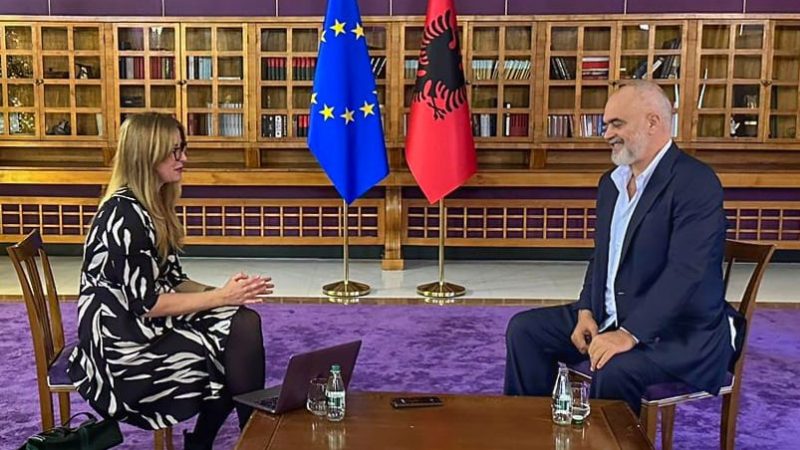
Albanian Prime Minister Edi Rama said he could not tell his country’s young people not to leave for a life abroad, but what is important is tackling exploitation and people trafficking and ensuring that some of those that leave come back.
Rama gave an exclusive interview with EURACTIV journalist Alice Taylor before the EU-Western Balkan summit, taking place in Tirana on Tuesday.
During the first six months of 2022, some 7,262 Albanians filed for asylum in Great Britain, a figure likely to increase significantly following waves of migration in the summer months and again in October and early November. Many of those making the journey in dinghies across The Channel were young people, mainly men.
“I have never thought, and I still don’t think that it’s a good idea to believe and let alone communicate, that the young people should absolutely stay here because I think they have the rights to try, and they should make use of their freedom, and it’s absolutely in their hands,” Rama said when asked how such figures make him feel.
The mass exodus of Albanians into Europe has been well documented in recent months after the British Home Secretary Suella Braverman called it an “invasion”, and British media pushed stories about them all being criminals or asylum seekers without proper justification.
Around half of all those seeking asylum in the UK are granted, with a further half being granted on appeal, despite Albania being a safe country of origin with no internal or external conflicts.
When asked how he feels to see the young and educated leaving, he said it is a phenomenon that impacts many other countries.
“I think it is a period of time that the country suffers for human resources from this phenomenon, brain drain, but on the other hand, when you see the history, everyone, every country has gone through this kind of trance, and in the future, it will be beneficial. I don’t really see it as a tragedy. I see it as a part of this period of history and also as part of life,” he said.
But the prime minister explained that when people leave, they bring back a new perspective, which is a positive.
“These people return with a different mentality, they come with some experience, and they open enterprises, they do things differently, and they make successes,” he said, giving agriculture as an example.
“Nowadays, we have the largest amount of production ever in agriculture, and we also have the highest amount of export ever. You see a lot of experience from emigration making the good of the country,” he added.
It is not known exactly how many have left the country in the last decade, but it is estimated between 400,000 and 700,000, with at least a further million leaving in the two decades after the fall of communism.
While many take the legal route, thousands choose illegal methods or file for asylum in the EU and UK.
Rama said you could not “suddenly make some magic” and stop people from going, but the key is improving conditions, so they return.
“I think we should know we should do everything to keep going, to improve conditions,” said Rama, adding that there is “no way to provide these people in this country with what they believe that they can get just by crossing the Channel.”
Rama concedes that, in hindsight, things could have been done differently to speed up Albania’s progress in key reform areas, including those under the EU scope.
Rama: EU accession not an ‘exam you can cheat on’, more work needed
Opinions on why so many are leaving now, are subject to much debate, but it has widely been attributed to poverty and the current economic crisis, corruption and crime, a weak rule of law and social disconnect traced back to the country’s 50 years of brutal communist rule.
In addition, organised crime gangs have taken to TikTok to advertise illegal crossings into the UK via boat for upwards of £3,000. This has caused an increase in the number of, mainly young Albanians leaving.
Rama, however, also calls into question the data that has been published in the UK.
“First of all, we have a problem with the data because we don’t know how many people are leaving from Albania to get there. Because as we know, in the past, the majority of this community in Britain has been formed by Albanians, living in Italy and Greece,” he said.
Both Italy and Greece are home to long-established Albanian communities and also are key locations for irregular migration. Rama said that a 100,000-plus Albanian community also acts as a critical pull factor in the UK.
“I think that it’s very obvious to me, at least especially for the young people that live in remote areas, or people from this area in northeast that have so many connections, already family connections, neighbour connections in Britain. This is the moment, and they want to go as they have the idea that Britain is now a place where you can easily find a job because of Brexit,” he added.
The UK is currently experiencing a worker shortage, with two-thirds of businesses reporting they are short-staffed.
For the prime minister, the most troubling part of the situation is the exploitation at the hands of traffickers, loan sharks and other criminals who monetise Albanian’s wish to leave.
“So what makes me really sick is to see that part of this story that has to do with exploitation that has to do with terribly disturbing conditions of travelling.”

